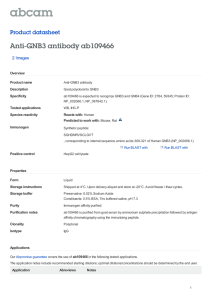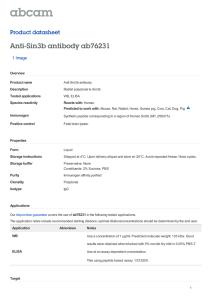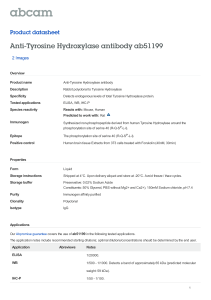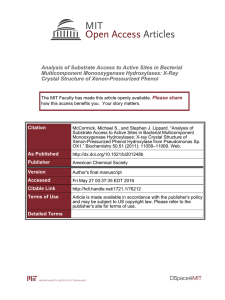Anti-PHD2 / prolyl hydroxylase antibody ab26058 Product datasheet 1 References 1 Image
advertisement
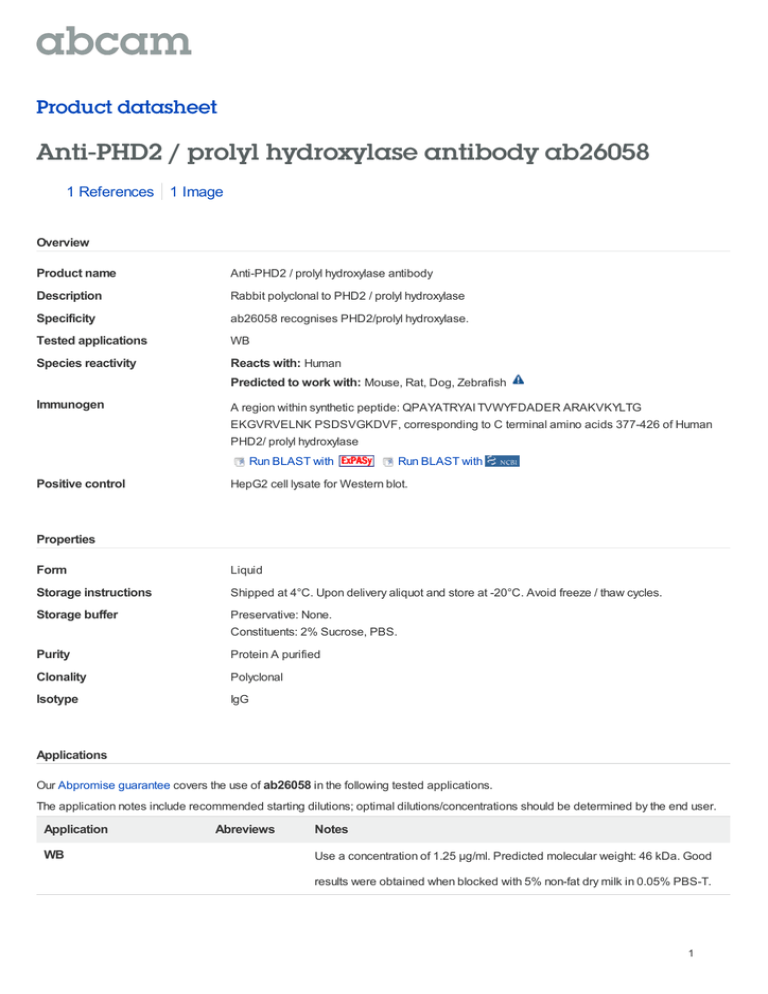
Product datasheet Anti-PHD2 / prolyl hydroxylase antibody ab26058 1 References 1 Image Overview Product name Anti-PHD2 / prolyl hydroxylase antibody Description Rabbit polyclonal to PHD2 / prolyl hydroxylase Specificity ab26058 recognises PHD2/prolyl hydroxylase. Tested applications WB Species reactivity Reacts with: Human Predicted to work with: Mouse, Rat, Dog, Zebrafish Immunogen A region within synthetic peptide: QPAYATRYAI TVWYFDADER ARAKVKYLTG EKGVRVELNK PSDSVGKDVF, corresponding to C terminal amino acids 377-426 of Human PHD2/ prolyl hydroxylase Run BLAST with Positive control Run BLAST with HepG2 cell lysate for Western blot. Properties Form Liquid Storage instructions Shipped at 4°C. Upon delivery aliquot and store at -20°C. Avoid freeze / thaw cycles. Storage buffer Preservative: None. Constituents: 2% Sucrose, PBS. Purity Protein A purified Clonality Polyclonal Isotype IgG Applications Our Abpromise guarantee covers the use of ab26058 in the following tested applications. The application notes include recommended starting dilutions; optimal dilutions/concentrations should be determined by the end user. Application WB Abreviews Notes Use a concentration of 1.25 µg/ml. Predicted molecular weight: 46 kDa. Good results were obtained when blocked with 5% non-fat dry milk in 0.05% PBS-T. 1 Target Function Catalyzes the post-translational formation of 4-hydroxyproline in hypoxia-inducible factor (HIF) alpha proteins. Hydroxylates HIF-1 alpha at 'Pro-402' and 'Pro-564', and HIF-2 alpha. Functions as a cellular oxygen sensor and, under normoxic conditions, targets HIF through the hydroxylation for proteasomal degradation via the von Hippel-Lindau ubiquitination complex. Tissue specificity According to PubMed:11056053, widely expressed with highest levels in skeletal muscle and heart, moderate levels in pancreas, brain (dopaminergic neurons of adult and fetal substantia nigra) and kidney, and lower levels in lung and liver. According to PubMed:12351678 widely expressed with highest levels in brain, kidney and adrenal gland. Expressed in cardiac myocytes, aortic endothelial cells and coronary artery smooth muscle. Involvement in disease Defects in EGLN1 are the cause of erythrocytosis familial type 3 (ECYT3) [MIM:609820]. ECYT3 is an autosomal dominant disorder characterized by increased serum red blood cell mass, elevated serum hemoglobin and hematocrit, and normal serum erythropoietin levels. Sequence similarities Contains 1 Fe2OG dioxygenase domain. Contains 1 MYND-type zinc finger. Anti-PHD2 / prolyl hydroxylase antibody images Anti-PHD2 / prolyl hydroxylase antibody (ab26058) at 1.25 µg/ml (in 5% skim milk / PBS buffer) + HepG2 cell lysate Secondary HRP conjugated anti-Rabbit IgG at 1/50000 dilution Western blot - PHD2/prolyl hydroxylase antibody (ab26058) Predicted band size : 46 kDa Please note: All products are "FOR RESEARCH USE ONLY AND ARE NOT INTENDED FOR DIAGNOSTIC OR THERAPEUTIC USE" Our Abpromise to you: Quality guaranteed and expert technical support Replacement or refund for products not performing as stated on the datasheet Valid for 12 months from date of delivery Response to your inquiry within 24 hours We provide support in Chinese, English, French, German, Japanese and Spanish Extensive multi-media technical resources to help you We investigate all quality concerns to ensure our products perform to the highest standards If the product does not perform as described on this datasheet, we will offer a refund or replacement. For full details of the Abpromise, please visit http://www.abcam.com/abpromise or contact our technical team. Terms and conditions Guarantee only valid for products bought direct from Abcam or one of our authorized distributors 2
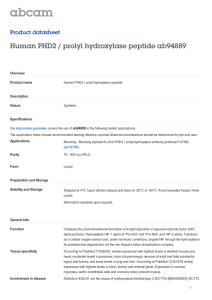
![Anti-PHD1/prolyl hydroxylase antibody [PHD112/G7] ab82884](http://s2.studylib.net/store/data/013790957_1-a660d8087f3d0e98f8029bb926288179-300x300.png)
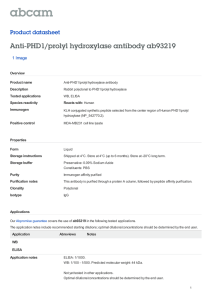
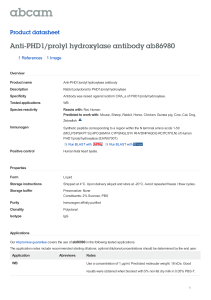
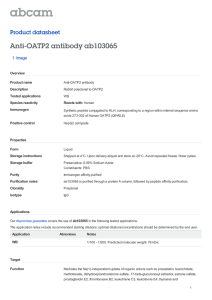
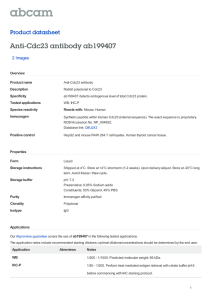
![Anti-ADK antibody [AT4F8] ab116250 Product datasheet 1 Image Overview](http://s2.studylib.net/store/data/011961019_1-1432a1113a6d3f7b75d5346febf7205a-300x300.png)
